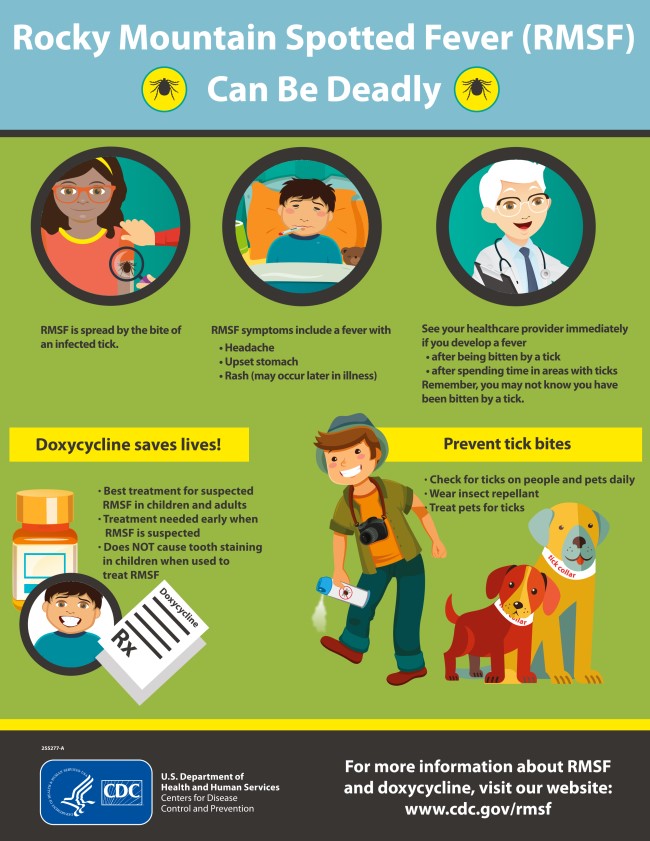General News
Murray-Calloway County Hospital Sees Spike in Rocky Mountain Spotted Fever Cases
July 6, 2022

Text Size:
MURRAY, KY – Murray-Calloway County Hospital has seen a spike in Rocky Mountain spotted fever cases during the last couple of months with a total of 27 cases.

“It is considered a reportable illness in KY, which is why we keep up with it so closely as well as the problems it can cause patients if not treated,” said Kathy Howard, LPN/Infection Prevention Nurse.
Rocky Mountain spotted fever is a bacterial infection transmitted by a tick. Without prompt treatment, Rocky Mountain spotted fever can cause serious damage to internal organs, such as your kidneys and heart.
Although it was first identified in the Rocky Mountains, Rocky Mountain spotted fever is most commonly found in the southeastern part of the United States.
Early signs and symptoms of Rocky Mountain spotted fever include a severe headache and high fever. A few days later, a rash usually appears on the wrists and ankles. Rocky Mountain spotted fever responds well to prompt treatment with antibiotics.
Although many people become ill within the first week after infection, signs and symptoms may not appear for up to 14 days. Initial signs and symptoms of Rocky Mountain spotted fever often are nonspecific and can mimic those of other illnesses:
- High fever
- Chills
- Severe headache
- Muscle aches
- Nausea and vomiting
- Confusion or other neurological changes
Causes
Rocky Mountain spotted fever is caused by infection with the organism Rickettsia rickettsii. Ticks carrying R. rickettsii are the most common source of infection.
If an infected tick attaches itself to your skin and feeds on your blood for six to 10 hours, you may pick up the infection. But you may never see the tick on you.
Rocky Mountain spotted fever primarily occurs when ticks are most active and during warm weather when people tend to spend more time outdoors. Rocky Mountain spotted fever cannot be spread from person to person.
Risk factors
Factors that may increase your risk of contracting Rocky Mountain spotted fever include:
- Living in an area where the disease is common
- The time of year — infections are more common in the spring and early summer
- How much time you spend in grassy or wooded areas
- Whether you have a dog or spend time with dogs
If an infected tick attaches to your skin, you can contract Rocky Mountain spotted fever when you remove it, as fluid from the tick can enter your body through an opening such as the bite site.
You can reduce your risk of infection by taking steps to prevent exposure to ticks and tick fluids. When removing a tick from your skin:
- Use a tweezers to grasp the tick near its head or mouth and remove it carefully
- Treat the tick as if it’s contaminated; soak it in alcohol or flush it down the toilet
- Clean the bite area with antiseptic
- Wash your hands thoroughly
Complications
Rocky Mountain spotted fever damages the lining of your smallest blood vessels, causing the vessels to leak or form clots. This may cause:
- Inflammation of the brain (encephalitis).In addition to severe headaches, Rocky Mountain spotted fever can cause inflammation of the brain, which can cause confusion, seizures and delirium.
- Inflammation of the heart or lungs.Rocky Mountain spotted fever can cause inflammation in areas of the heart and lungs. This can lead to heart failure or lung failure in severe cases.
- Kidney failure.Your kidneys filter waste from your blood, and the blood vessels within the kidneys are very small and fragile. Damage to these vessels can eventually result in kidney failure.
- Serious infection, possibly amputation.Some of your smallest blood vessels are in your fingers and toes. If these vessels don’t work properly, the tissue at your farthest extremities may develop gangrene and die. Amputation would then be necessary.
- Untreated, Rocky Mountain spotted fever has, historically, had a death rate as high as 80 percent.
Prevention
You can decrease your chances of contracting Rocky Mountain spotted fever by taking some simple precautions:
- Wear long pants and sleeves.When walking in wooded or grassy areas, wear shoes, long pants tucked into socks and long-sleeved shirts. Try to stick to trails and avoid walking through low bushes and long grass.
- Use insect repellents.Products containing DEET (Off! Deep Woods, Repel) often repel ticks. Be sure to follow the instructions on the label. Clothing that has permethrin impregnated into the fabric is toxic to ticks and also may be helpful in decreasing tick contact when outdoors.
- Do your best to tick-proof your yard.Clear brush and leaves where ticks live. Keep woodpiles in sunny areas.
- Check yourself and your pets for ticks.Do this after being in wooded or grassy areas. Some ticks are no bigger than the head of a pin, so you may not discover them unless you are very careful.
- Remove a tick with tweezers.Gently grasp the tick near its head or mouth. Don’t squeeze or crush the tick, but pull carefully and steadily. Once you have the entire tick removed, wash the bite area with rubbing alcohol or soap and water.
Soak the tick in alcohol or flush it down the toilet. Wash your hands thoroughly to make sure any infected tick fluid is completely removed.
Though there are many purportedly effective methods for helping to remove a tick, such as petroleum jelly, alcohol or even applying a hot match to the tick’s body, none is a good method for tick removal.
Murray-Calloway County Hospital is a 152-licensed bed medical center located at 803 Poplar Street in Murray, Kentucky. The hospital has been serving the medical and health care needs of the Western Kentucky area for over 100 years. Murray Hospital specializes in such major areas as women’s services, surgery, cancer, orthopedics, neurology, psychiatric services, emergency services and more. Murray-Calloway County Hospital is accredited by the Joint Commission on the Accreditation of Healthcare Organizations, the nation’s oldest and largest hospital accreditation agency.

